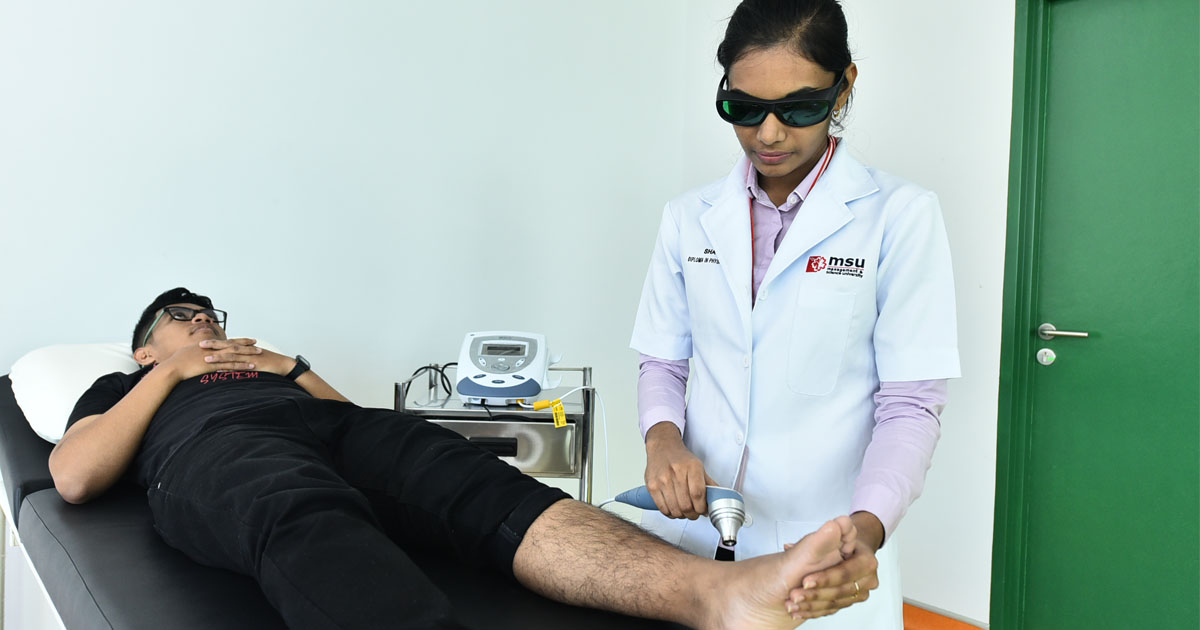

With many health issues attributed to life in the 21st century, there has never been a better time to study nutrition. MSU examines how diet links with disease.
Nutrition has for some time been an occupational health and safety concern for its effect on performance and productivity. Poor nutrition can lead to poor liver function, perpetuating a cycle of ill health.
MSU Diploma in Occupational Safety and Health
Poor nutrition also increases the risk of developing non-communicable diseases (NCDs) such as cancer, diabetes, and cardiovascular diseases (e.g., coronary heart diseases, cerebrovascular diseases such as strokes, and peripheral vascular diseases). The fatigue it induces compromises safe operation of plants and machinery by means of impaired physical and mental functions.

MSU Bachelor in Cardiovascular Technology (Honours)
MSU Bachelor of Science in Mechanical Engineering (Honours)
NCDs contributed over 79 percent of illnesses in the world population and over thirty-four million deaths from the 52.8 million worldwide in 2010. Twenty-nine percent of the deaths occurred in people under 60, and about 80 percent of the deaths were recorded by low- to middle-income countries.
Higher blood pressure, blood cholesterol, and insulin resistance associated with overweight and obesity raise mortality numbers of NCD-related deaths as well as risks of developing an NCD. Diets high on meat and dairy may contribute to higher blood pressure, whilst diets high on processed foods and/or sugars contribute to overweight and obesity.
A nutrition-related study on NCD sufferers across 194 countries found no progress or worsening conditions in obese men (180 countries), obese women (178 countries), diabetic men (182 countries), and diabetic women (164 countries). Only 26 countries had diabetic women staying on course versus 8 countries for diabetic men.

In relation to education level, a 2009 study found one country to have the greatest number (60-70 percent of its total population) of overweight or obese women who had had little education. Another country recorded 50-60 percent of its total population as comprising medium-to-highly educated overweight or obese women.
Global Nutrition Report 2018 showed increases in global prevalence of obesity (BMI of 30 and above) among adults aged 18 years and above; from 10.6 percent to 15.1 percent in women, and from 6.7 percent to 11.1 percent in men.
[References: MSU MigWHealth Congress 2018, Nutrition and Non-Communicable Diseases in Migrant Workers]
A call for action
Students of nutrition might take up studies because they wanted to learn more about healthy eating and nourishment, but, when they begin to understand how diet relates with health and disease, they would also realize the importance of sharing the knowledge to help others lead healthier lives. The call to a higher purpose releases feel-good chemicals which in turn produce what is called the “helper’s high”.

Nutritionists work holistically, addressing an underlying cause which may have its roots in a different location from that of the symptom. A hypoglycaemia-induced headache, for example, may be traced to the patient’s eating pattern contributing to an energy gap when not enough is eaten at the right time of day.
Nutrition is studied by healthcare personnel such as fitness professionals, nurses, and psychologists to complement their areas of expertise; building skills that enhance patient advice, counselling, or guidance.
MSU Bachelor in Nursing (Honours)
MSU Diploma in Nursing
MSU Bachelor of Counselling and Guidance (Honours)
MSU Diploma in Counselling and Guidance
Fitness professionals study nutrition to understand how food science complements exercise.

MSU Diploma in Sport Science
MSU Diploma in Physiotherapy
Psychology experts may gain insights into how diet affects mental health.
MSU Bachelor in Psychology (Honours)
A good working knowledge of nutrition thus complements other therapies in so many ways.

MSU Bachelor of Food Service Technology (Honours)
MSU Master in Food Service Technology
MSU PhD in Food Service Technology
With many health issues attributed to life in the 21st century, there has never been a better time to study nutrition. MSU examines how diet links with disease.
Nutrition has for some time been an occupational health and safety concern for its effect on performance and productivity. Poor nutrition can lead to poor liver function, perpetuating a cycle of ill health.
MSU Diploma in Occupational Safety and Health
Poor nutrition also increases the risk of developing non-communicable diseases (NCDs) such as cancer, diabetes, and cardiovascular diseases (e.g., coronary heart diseases, cerebrovascular diseases such as strokes, and peripheral vascular diseases). The fatigue it induces compromises safe operation of plants and machinery by means of impaired physical and mental functions.

MSU Bachelor in Cardiovascular Technology (Honours)
MSU Bachelor of Science in Mechanical Engineering (Honours)
NCDs contributed over 79 percent of illnesses in the world population and over thirty-four million deaths from the 52.8 million worldwide in 2010. Twenty-nine percent of the deaths occurred in people under 60, and about 80 percent of the deaths were recorded by low- to middle-income countries.
Higher blood pressure, blood cholesterol, and insulin resistance associated with overweight and obesity raise mortality numbers of NCD-related deaths as well as risks of developing an NCD. Diets high on meat and dairy may contribute to higher blood pressure, whilst diets high on processed foods and/or sugars contribute to overweight and obesity.
A nutrition-related study on NCD sufferers across 194 countries found no progress or worsening conditions in obese men (180 countries), obese women (178 countries), diabetic men (182 countries), and diabetic women (164 countries). Only 26 countries had diabetic women staying on course versus 8 countries for diabetic men.

In relation to education level, a 2009 study found one country to have the greatest number (60-70 percent of its total population) of overweight or obese women who had had little education. Another country recorded 50-60 percent of its total population as comprising medium-to-highly educated overweight or obese women.
Global Nutrition Report 2018 showed increases in global prevalence of obesity (BMI of 30 and above) among adults aged 18 years and above; from 10.6 percent to 15.1 percent in women, and from 6.7 percent to 11.1 percent in men.
[References: MSU MigWHealth Congress 2018, Nutrition and Non-Communicable Diseases in Migrant Workers]
A call for action
Students of nutrition might take up studies because they wanted to learn more about healthy eating and nourishment, but, when they begin to understand how diet relates with health and disease, they would also realize the importance of sharing the knowledge to help others lead healthier lives. The call to a higher purpose releases feel-good chemicals which in turn produce what is called the “helper’s high”.

Nutritionists work holistically, addressing an underlying cause which may have its roots in a different location from that of the symptom. A hypoglycaemia-induced headache, for example, may be traced to the patient’s eating pattern contributing to an energy gap when not enough is eaten at the right time of day.
Nutrition is studied by healthcare personnel such as fitness professionals, nurses, and psychologists to complement their areas of expertise; building skills that enhance patient advice, counselling, or guidance.
MSU Bachelor in Nursing (Honours)
MSU Diploma in Nursing
MSU Bachelor of Counselling and Guidance (Honours)
MSU Diploma in Counselling and Guidance
Fitness professionals study nutrition to understand how food science complements exercise.

MSU Diploma in Sport Science
MSU Diploma in Physiotherapy
Psychology experts may gain insights into how diet affects mental health.
MSU Bachelor in Psychology (Honours)
A good working knowledge of nutrition thus complements other therapies in so many ways.

MSU Bachelor of Food Service Technology (Honours)
MSU Master in Food Service Technology
MSU PhD in Food Service Technology